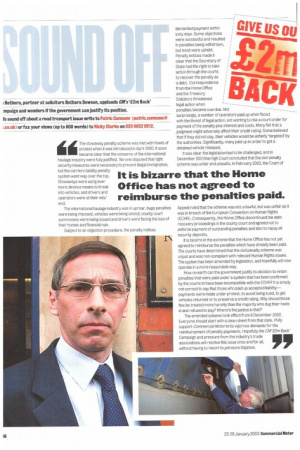Rothera, partner at solicitors Rothera Dowson, applauds ClIVS2m Back' mpaign and wonders if the government can Justify Its position.
Page 46

If you've noticed an error in this article please click here to report it so we can fix it.
fo sound off about a road transport issue write to Patric Cunnane (patric.cunnane*
Lco.uk) or fax your views (up to 600 words) to Ricky Clarke on 020 8652 8912.
dd The stowaway penalty scheme was met with howls of
protest when it was introduced in April 2000. It soon The international haulage industry was in uproar, huge penalties were being imposed, vehicles were being seized, county court summonses were being issued and drivers were facing the loss of their homes and financial ruin.
Subject to an objection procedure, the penalty notices demanded payment within sixty days. Some objections were successful and resulted in penalties being withdrawn, but most were upheld.
notices made it Penalty clear that the Secretary of 1 State had the right to take action through the courts / to recover the penalty as a debt. Correspondence from the Home Office and the Treasury Solicitors threatened legal action when penalties became overdue. Not — surprisingly, a number of operators paid up when faced with the threat of legal action, not wanting to risk a court order for payment of the penalty plus interest and costs. Many felt that a judgment might adversely affect their credit rating. Some believed that if they did not pay, their vehicles would be unfairly 'targeted' by the authorities. Significantly, many paid up in order to get a detained vehicle released.
It was clear the legislation had to be challenged, and in December 2001the High Court concluded that the civil penalty scheme was unfair and unlawful. In February 2002, the Court of Appeal ruled that the scheme was not unlawful, but was unfair as it was in breach of the European Convention on Human Rights (ECHR). Consequently, the Home Office discontinued the debt recovery proceedings in the county court and agreed not to enforce payment of outstanding penalties and also to repay all security deposits.
It is bizarre in the extreme that the Home Office has not yet agreed to reimburse the penalties which have already been paid. The courts have determined that the civil penalty scheme was unjust and was non-compliant with relevant Human Rights issues. The system has been amended by legislation, and hopefully will now operate in a more reasonable way.
How on earth can the government justify its decision to retain penalties that were paid under a system that has been confirmed by the courts to have been incompatible with the ECHR? It is simply not correct to say that those who paid up accepted liability— payments were made under protest, to avoid being sued, to get vehicles returned or to preserve a credit rating. Why should those few be treated more harshly than the majority who dug their heels in and refused to pay? Where's the justice in that?
The amended scheme took effect from 8 December 2002. Everyone should start with a clean sheet from that date. I fully support Commercial Motor in its vigorous demands for the reimbursement of penalty payments. Hopefully the CM'.22m Back' Campaign and pressure from the industry's trade
associations will resolve this issue once and for all, without having to resort to yet more litigation.




























































































































































